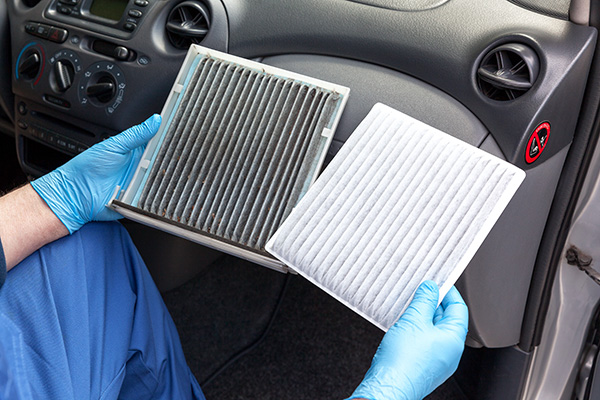
When the air inside your car starts feeling stale or weak, it’s easy to blame the weather or the A/C system. But often, the real problem is much simpler: a dirty cabin air filter. This small, often-forgotten component can make a big difference in how your heating and air conditioning system performs.
A clean filter keeps airflow strong and the air you breathe fresh. Once it clogs, though, the vents can lose power, strange smells can creep in, and the defroster may take longer to clear your windshield. If your car feels stuffy or the fan seems weaker than usual, the cabin air filter might be the culprit.
What Does the Cabin Air Filter Do
The cabin air filter sits behind the glove box or beneath the dashboard in most vehicles. Its main job is to clean the outside air before it reaches your vents. It traps dust, pollen, mold spores, smog, and even tiny insects that would otherwise circulate inside your car.
Think of it like the air filter in your home’s HVAC system. It keeps debris out of delicate components and helps maintain healthy air quality inside the cabin.
Signs Your Cabin Air Filter Needs to Be Replaced
Many drivers forget this filter exists until something starts to feel off. Here are a few signs it may be overdue for replacement:
- Airflow from the vents feels weaker, even on high fan settings
- A musty or moldy smell comes from the vents
- The windows fog up more easily in humid or cold weather
- You notice more dust settling on your dashboard
- You or your passengers start sneezing or getting itchy eyes while driving
If you notice one or more of these issues, don’t ignore them. They tend to get worse over time, especially if you drive in dusty or pollen-heavy areas. A neglected filter can even strain the blower motor, which leads to more expensive repairs later.
How a Dirty Filter Hurts HVAC Performance
When the filter gets clogged, air struggles to pass through. That makes the blower motor work harder, reducing its lifespan and overall efficiency. You might notice your A/C or heater taking longer to reach the right temperature.
In colder weather, that restricted airflow means poor defrosting, which can affect visibility. During hot days, the A/C may seem weak even when the refrigerant level is fine, simply because not enough air is moving through the vents.
How Often Should You Replace the Cabin Air Filter
Most automakers suggest replacing the cabin air filter every 12,000 to 15,000 miles, or at least once a year. But if you often drive on dirt roads, park under trees, or live with heavy pollen, you may need to replace it more frequently.
The good news is that it’s a quick, inexpensive service that can instantly improve your comfort and HVAC performance.
Can You Replace It Yourself
In some vehicles, yes. Swapping the cabin air filter is as easy as opening a panel behind the glove box. In others, it’s a little trickier and may involve removing trim pieces and clips.
If you’re not sure where yours is or how to access it, having a technician check it during routine maintenance is a smart move. They can show you the old filter and let you know if it’s time for a new one.
Breathe Easier Behind the Wheel
If your A/C feels weak, your car smells musty, or the air just doesn’t seem fresh anymore, don’t overlook the cabin air filter. Replacing it can quickly restore airflow, improve comfort, and help your HVAC system run more efficiently.
Cabin Air Filter Replacement in Burnt Hills, NY at Gil’s Garage Inc
At Gil’s Garage Inc in Burnt Hills, NY, our technicians inspect your cabin air filter during every service visit. If it’s dirty or clogged, we’ll replace it with a high-quality filter that keeps the air clean and your HVAC system working like it should.
Stop by today for a quick check and enjoy fresher, healthier air inside your car.